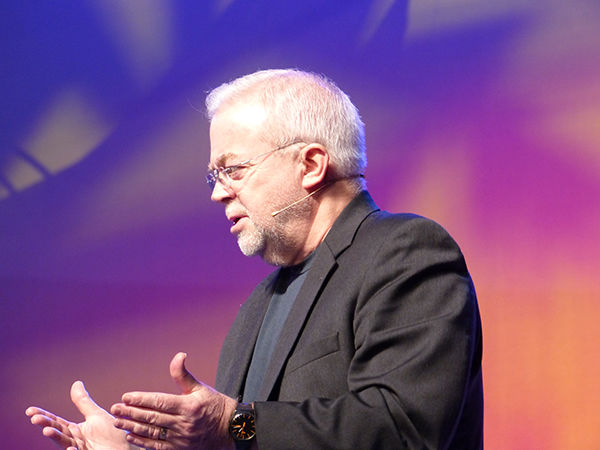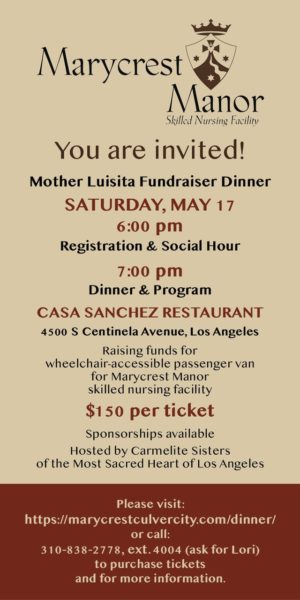The Religious Education Congress annually offers more than 250 workshops on topics that address every facet of Catholic living, parish ministry and social outreach. On this page, The Tidings presents a selection of offerings from the three days. More can be found at www.the-tidings.com.
Immigration: A Moral, Ethical Issue
Bishop Gerald Kicanas of Tucson, March 14:
The assertion that immigration is a moral, ethical issue is strongly supported by Scripture, Catholic social teaching, papal statements and elsewhere in the Church, said Bishop Kicanas. Unfortunately, because the immigration debate remains stalled in Washington, comprehensive reform seems unlikely to happen before the 2016 presidential election.
In the response to anti-immigrant sentiment across America (both within and outside its churches), Bishop Kicanas asserted that, as people of faith, “We have to intensify our voice for reasonable comprehensive immigration policy reform that will allow people to come here to work, to care for their families. We need to find ways to bring the undocumented out of the shadows, so they are not living in constant fear. Our voice has to be heard.
“We can’t give up. Let us pray to the Lord that our Congress and president will have the courage to pass comprehensive immigration reform — now.”
---Maria Luisa Torres
What Children Give to Parents
Dr. Christopher Kaczor, Loyola Marymount University professor of Philosophy, March 16:
Despite gray hairs, ulcers and empty bank accounts, children can strengthen not only their parents’ marriage but also can put them on the path to heaven, said Kaczor, a father of nine.
He began the discussion with what good parents give their children: life itself, filling physical and spiritual needs. But flip the coin, he said, and see how children strengthen their parents’ erotic marital love and their friendship with each other through a shared experience of raising a child. Kaczor pointed to research showing that having a baby decreases the chance of divorce.
Children also provide opportunities for their parents to selflessly practice virtues of patience, responsibility, self-sacrifice and charity. Kaczor also described how children give parents a glimpse of God’s unconditional love for mankind.
“Even after a difficult day with a challenging offspring, parents will look in at their sleeping child and feel full of overwhelming tender love,” he said, “which indeed mirrors how God sees us.”
—Brenda Rees
Temptation, Suffering and Forgiveness: The Spiritual Life
Dr. Greer Gordon, theologian, author and lecturer, March 14:
Who was the biggest sinner in the Prodigal Son parable?
Gordon, a former faculty member at Dartmouth and Regis College, said the older sibling who stayed home, steadfastly obeying his father and working in his fields, might, in fact, have harbored the greater evil.
“The older son may be the bigger sinner when seen in the light of Cain’s resentment,” she said. “His self-righteousness is overwhelming, a resentment not only of his brother, but of his father’s generosity as well.”
Gordon asserted that loyal Catholics “who have stayed in our faith” often have a similar resentment against Catholics who left their religion only to return when crisis happens, like the death of a parent or spouse. That negativity can flare up in more secular environs, simply over a new coworker who’s faster on the job.
“We have the tendency not to recognize resentment in ourselves,” observed Gordon. “But we have to look at that and forgive if we are to go deeper in our own spiritual lives.”
—R.W. Dellinger
Why the Young Church Is Falling Away and What We Can Do About It
Mark Hart, Life Teen executive vice president, March 14:
The most direct and effective way of reaching out to teens to help them find the path home to Christ, said Hart, is to cultivate a true relationship by engaging in genuine dialogue by speaking “with” them versus “at” them — and by never giving up.
“Teens are going to break your heart,” explained Hart, “but you must never, ever give up on a young soul; you have not failed until you stop trying. You have to cultivate — give it time, give Him time — because with Christ, there isn’t death; with Christ, no situation is impossible; with Christ, no situation is hopeless. Don’t ever give up on a soul, because every soul is worth fighting for.
“You never, ever stop praying for, and walking with, and loving our young people. We never stop walking with them because that’s what we’re designed to do, and that is how the Church goes on.”
---Maria Luisa Torres
Evangelization and Justice in the Church’s Mission
Dr. Jonathan Reyes, executive director, USCCB Dept. of Justice, Peace and Human Development, March 15:
“We must evangelize,” Reyes asserted. “We all must evangelize because as Christians we are called to do it. And not much training is needed to speak; be a missionary disciple.”
Reyes noted that Pope Francis always seems “to call us to do even better. We are impelled to do it. ‘None of us can think we are exempt from being with the poor and social justice,’ said Pope Francis.”
All are called in evangelization to desire, seek and protect others — and to profess Jesus. Good work, the pope has said, is possible, but without Jesus it is just charitable work.
“We must encounter Jesus Christ in the dignity of the person,” said Reyes, “When it is manifested, we consider man’s origin and destiny. Everyone has the right to pursue what will give dignity. Our happiness depends on that destiny.”
—Sister Nancy Munro, CSJ
10 Ways to Engage, Empower and Ignite the Faith of Young Adults
Julianne Stanz, director of New Evangelization, Diocese of Green Bay, March 15:
Ireland-born and educated Julianne Stanz now lives in the U.S., but brings with her deep roots and knowledge of how St. Patrick evangelized Ireland.
As one who evangelized, Patrick realized the importance of natural symbols, said Stanz. He kept the ancient Irish symbol of the sun as part of the Celtic cross he created. The circle of Patrick’s cross represents the sun, an ancient symbol to the Irish, and the endless circle of life.
“We are all here from somewhere else,” said Stanz. This, too, is part of the New Evangelization, as is joy. “Joy is the key,” says Stanz. “J is Jesus, O is others, and Y is yourself.”
Referring to Pope Francis’ message on evangelization in Evangelii Gaudium, Stanz added: “Don’t wear a cross around your neck if all you’re going to do is complain about the one on your back.”
—Sister Nancy Munro, CSJ
The Re-making of the Papacy: From Pope Paul VI to Pope Francis
Dr. Richard Gaillardetz, Joseph Professor of Catholic Systematic Theology at Boston College, March 14:
In an overview of the papacy, Gaillardetz outlined the differences between the first and second millennia. During the first 1,000 years the pope did not appoint bishops and other leaders called the early councils. With the second millennium, Church reform established an “imperial papacy” and in the Gregorian Reforms of the 11th century brought about an unintended consequence: popes appeared to have more power than the emperor and thus were treated more like emperors.
The modern papacy, said Gaillardetz, evolved into a more “antagonistic mode.” In 1846 the pope fled Rome for his life. The writing of encyclicals grew, papal states fell out of church hands and authoritarianism grew under Pope Pius XII.
Pope John XXIII began the transition from modernism to ultra-modernism to post-modern and the calling of Vatican II. Pope Paul VI went to the United Nations and began change, and Pope John Paul II visited Jerusalem and reached out to non-European countries.
Pope Benedict XVI, “very theological,” accomplished a great deal to prepare the way for Pope Francis with his fresh reception of Vatican II, the role of symbols and dialogue in the Church, and the role of the “people of God.”
—Sister Nancy Munro, CSJ
Revolutionary Hope
Rev. Jim Wallis, author, editor-in-chief of Sojourners and public theologian, March 14:
In his popular arena workshop, the Rev. Jim Wallis urged people to be “examples of hope” in a secular world. “Our vocation as Christians is to offer unexpected hope,” he said, walking the stage, side to side. “And Pope Francis is the delightful surprise today.”
So how do we bring unexpected hope?
“Skepticism is good, it’s healthy, but cynicism isn’t,” the evangelical preacher and writer noted. “It says nothing will ever change. It keeps us from making personal commitments to take personal risks. And we find it on all sides, left and right.”
It was crucial, Wallis urged, to keep asking the Gospel query, “When did we see you, Lord?” The most prominent answer for Americans right now is the nation’s 11 million undocumented men, women and children.
“We offer unexpected hope — hoping, believing in spite of the evidence, and then watching it change things,” stressed Wallis. “I’m seeing hope I haven’t in my lifetime on immigration reform. Evangelicals and Catholics have joined together to accomplished it.”
—R.W. Dellinger

